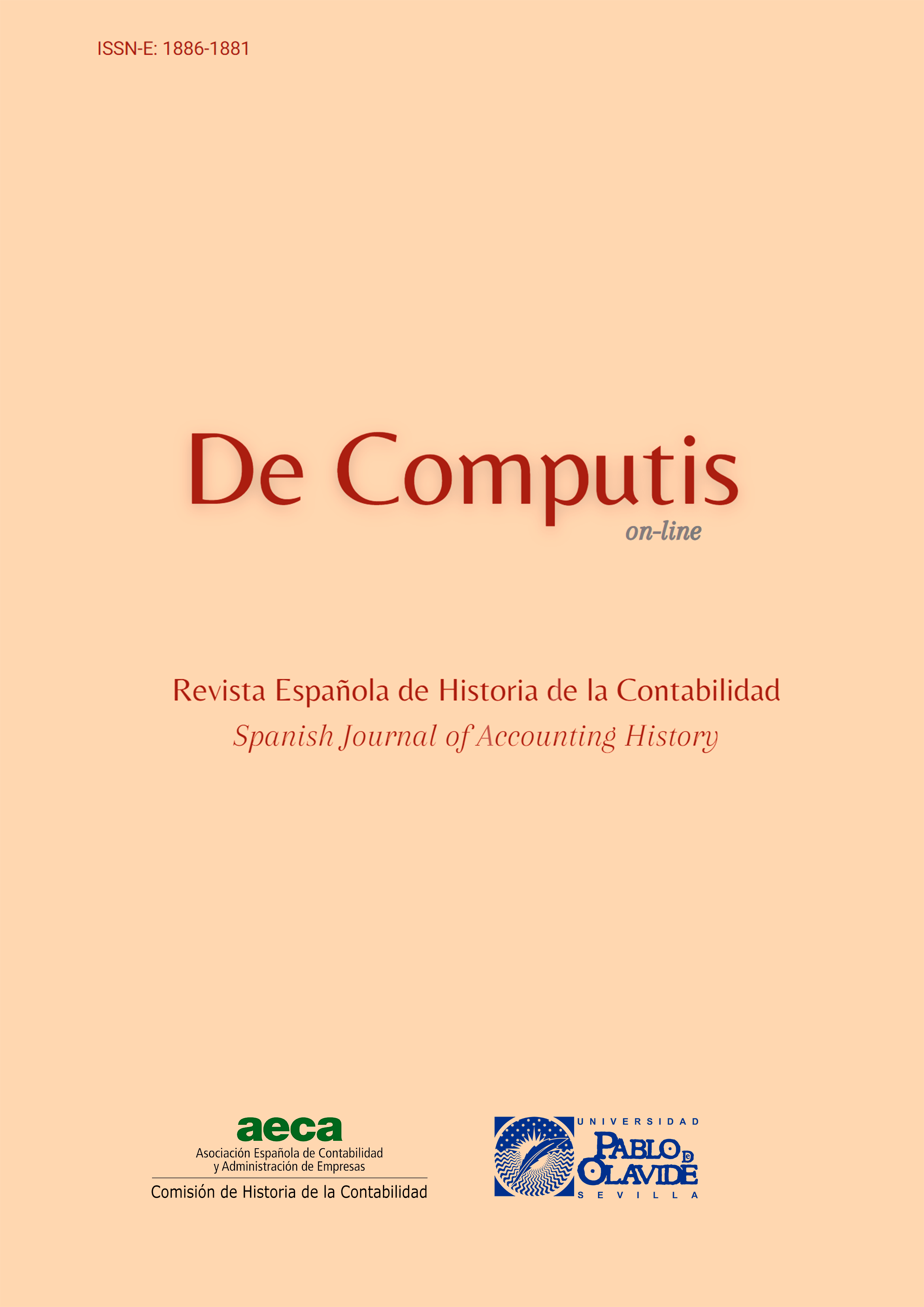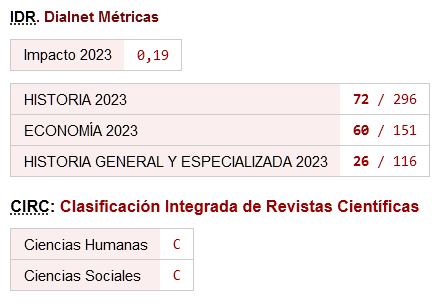The advent of double-entry bookkeepıng and accountıng reforms ın the Ottoman Empıre ın the 19th Century
DOI:
https://doi.org/10.26784/issn.1886-1881.21.2.10968Parole chiave:
sanitary (health) organization, 19th Century, accounting history, Ottoman Empire, corporate regulation, Merdiban Method, double-entry bookkeepingAbstract
There was a significant shift in the accounting methodology of the Ottoman Empire in the 19th century, transitioning from traditional state accounting methods to Western double-entry bookkeeping (DEB). This paper focuses on the 1884 General Accounting Directive of the Sanitary (Health) Organization to examine the interplay of internal reforms and external influences that drove this transition. The introduction of DEB, a leap towards modernization, encountered challenges, including the need for extensive training for accountants accustomed to traditional methods and the integration of Western practices within the Ottoman administrative framework. Using the metaphor of legal transplants, the paper argues that the Empire’s adoption of these accounting changes. This research contributes to understanding the interaction between local traditions and foreign influences in shaping accounting practices.
Downloads
Riferimenti bibliografici
Prime Ministry Ottoman Archives (BOA), “Sıhhiye Teşkilatı'nın Genel Muhasebe Talimatı”, MERDIBAN. PRK.SH… 1/47; MERDIBAN-08-05-1301. Varak No:1.
Prime Ministry Ottoman Archives (BOA), “Sıhhiye Teşkilatı'nın Genel Muhasebe Talimatı”, MERDIBAN. PRK.SH… 1/47; MERDIBAN-08-05-1301. Varak No:2.
Prime Ministry Ottoman Archives (BOA), “Sıhhiye Teşkilatı'nın Genel Muhasebe Talimatı”, MERDIBAN. PRK.SH… 1/47; MERDIBAN-08-05-1301. Varak No:3
Prime Ministry Ottoman Archives (BOA), “Sıhhiye Teşkilatı'nın Genel Muhasebe Talimatı”, MERDIBAN. PRK.SH… 1/47; MERDIBAN-08-05-1301. Varak No:4.
Prime Ministry Ottoman Archives (BOA), DUİT 37-2/7-2/6; DUİT 37-2/7-2/2, 37- 2/7-2/4.
Prime Ministry Ottoman Archives (BOA), SUİT 37 – 2/7 – 2/4.
Akinyemi, B., Okoye, A. E., & Izedonmi, P. F. (2015). History and Development Of Accounting in Perspective. International Journal of Sustainable Development Research, 1(2), 14-20. https://doi.org/10.11648/j.ijsdr.20150102.11
Aydemir, O., and Erkan, M. (2011). Merdiven Kayıt Yöntemi ve Günümüz Muhasebe Sistemi. Muhasebe ve Finans Tarihi Araştırmaları Dergisi, (1), 110-128. https://dergipark.org.tr/tr/download/article-file/319989
Can, A. V., Aliusta, H., Bağdat, A. (2021). Osmanlı Devleti’nde Çift Taraflı Kayıt Yöntemine Geçişi Etkileyen Sosyo-Kültürel Nedenlerin Analizi. Muhasebe ve Vergi Uygulamaları Dergisi. 14 (3), 1231-1259. https://doi.org/10.29067/muvu.902595
Çabuk, A., and Saygılı, A. T. (2013). Osmanlı İmparatorluğu'nda XIX. Yüzyılın Ortalarında Devlet Muhasebesinde Merdiven Yönteminden Çift Yanlı Kayıt Yöntemine Geçiş. Muhasebe ve Finans Tarihi Araştırmaları Dergisi, (4), 168-196.https://dergipark.org.tr/tr/download/article-file/319938
Çabuk, A., Saygılı, A. T., and Oğuz, M. (2018). Auditing of a Waqf in the Beginning of 19th Century. Accounting & Financial History Research Journal, (14), 124-156. https://dergipark.org.tr/en/download/article-file/395840
Çavuşoğlu, H. (2011). Ali Coşkun'un TOBB Başkanlığı Döneminde TOBB-Siyaset İlişkisi. Eskişehir Osmangazi Üniversitesi Sosyal Bilimler Dergisi, 12(1), 51-61. https://dergipark.org.tr/tr/download/article-file/113325
De Tocqueville, A. (1998). The Old Regime and the Revolution: The Complete Text (Vol. 1). University of Chicago Press.
Elitaş, C., O. Güvemli, O. Aydemir, M. Erkan, U. Özcan ve M. Oğuz (2008), Osmanlı İmparatorluğu’nda 500 Yıl Boyunca Kullanılan Muhasebe Yöntemi: Merdiven Yöntemi, T.C. Maliye Bakanlığı Yayınları, ISBN: 978-975-8195-16-9, Ankara, Nisan.
Erkan, M. (2011). Accounting Education in The Ottoman State. International Journal of Business and Social Science, 2(13). https://ijbssnet.com/journals/Vol._2_No._13_Special_Issue_July_2011/23.pdf
Faroqhi, S. (2004). The Ottoman Empire and The World Around It. Bloomsbury Publishing.
Goldbach, Toby Susan. 2019. Why Legal Transplants? Annual Review Of Law And Social Science. 15: 583-601. https://doi.org/10.1146/annurev-lawsocsci-101518-042617
Gomes, D. (2007). Accounting Change in Central Government: The Institutionalization of Double Entry Bookkeeping at The Portuguese Royal Treasury (1761-1777). Retrieved from:https://repositorium.uminho.pt/bitstream/1822/6754/1/Tese%20Doutoramento%20Delfina%20Gomes.pdf
Güvemli, O. (2000). Türk Devletleri Muhasebe Tarihi: Tanzimat'tan-Cumhuriyet'e. Vol 3. Avcıol Basım-Yayın. Istanbul.
Güvemli, O. (2005). Türkiye’de Ticaret Liselerinin Kuruluş Öyküsü. Muhasebe ve Finansman Dergisi, (28), 16-23. https://dergipark.org.tr/tr/download/article-file/425943
Güvemli, O., and Kaya, M. A. (2015). Osmanlı İmparatorluğu’nda XIX. Yüzyılın Ortalarında Muhasebe Düşüncesindeki Büyük Değişim-1839-1885. Muhasebe ve Finans Tarihi Araştırmaları Dergisi, (9), 43-65. https://dergipark.org.tr/tr/download/article-file/319880
Güvemli, O., Toraman, C., and Güvemli, B. (2015). State Accounting in the Ottoman Empire–Anatolian Accounting Recording Culture. Public Oversight Accounting and Auditing Standarts of Board of Turkey. Ankara.
Güvemli, O., Zeytinoğlu, E., and Aygül, E. (2016). Osmanlı İmparatorluğunda Çift Yanlı Kayıt Yönteminin XIX. Yüzyılın İkinci Yarısında Bir Sanayi İşletmesinde Ilk Kez Uygulaması-Tütün Rejisi Örneği. Muhasebe ve Finans Tarihi Araştırmaları Dergisi, (11), 197-223. https://dergipark.org.tr/tr/download/article-file/319851
Hernández Esteve, E. (1993). Problemátıca General De Una Hıstorıa De La Contabılıdad En España. Revısıón Genérıca De Las Modernas Corrıentes Epıstemológıcas Y Metodológıcas, Y Cuestıones Específıcas. Contaduría Universidad De Antioquia, (21-22), 26–92. https://doi.org/10.17533/udea.rc.25514
Kasaba, R. (1988). The Ottoman Empire And The World Economy: The Nineteenth Century. Suny Press.
Lemarchand, Y. (1999). Introducing Double-Entry Bookkeeping in Public Finance: A French Experiment at The Beginning Of The Eighteenth Century. Accounting, Business & Financial History, 9(2), 225-254. https://doi.org/10.1080/095852099330313
Littleton, A. C. (1927). The Antecedents of Double-Entry. The Accounting Review, 2(2), 140–149. http://www.jstor.org/stable/239203
McKinnon, J. (1994). The Historical and Social Context Of The Introduction Of Double Entry Bookkeeping To Japan. Accounting, Business & Financial History, 4(1), 181-201. https://doi.org/10.1080/09585209400000043
Merryman JH. (1981). On The Convergence (And Divergence) Of the Civil Law and The Common Law. Stanford J. Int. Law 17(2):357–88. https://purl.stanford.edu/mg397hp5172
Miller, J. M. (2003). A Typology of Legal Transplants: Using Sociology, Legal History and Argentine Examples to Explain the Transplant Process. The American Journal of Comparative Law, 51(4), 839–885. https://doi.org/10.2307/3649131
Napier, C. J. (1989). Research Directions in Accounting History. The British Accounting Review, 21(3), 237-254. https://doi.org/10.1016/0890-8389(89)90095-4
Orbay, K. (2013). Account Books of The Imperial Waqfs (Charitable Endowments) In the Eastern Mediterranean (15th To 19th Centuries). Accounting Historians Journal, 40(1), 31-50. https://doi.org/10.2308/0148-4184.40.1.31
Pamuk, Ş. (1984). The Ottoman Empire in the “Great Depression” Of 1873–1896. The Journal of Economic History, 44(1), 107-118. https://doi.org/10.1017/S0022050700031399
Reid, J. J. (2000). Crisis of The Ottoman Empire: Prelude to Collapse 1839-1878 (Vol. 57). Franz Steiner Verlag. Stuttgart.
Sacco, R. (1991). Legal Formants: A Dynamic Approach to Comparative Law (Installment I Of II). The American Journal of Comparative Law, 39 (1),1–34. https://doi.org/10.2307/840669
Sangster, A. (2016). The Genesis of Double Entry Bookkeeping. The Accounting Review, 91(1), 299-315. https://doi.org/10.2308/accr-51115
Şener, A. (1990). Tanzimat ve Osmanlı Maliyesi. Hacettepe Üniversitesi İktisadi ve İdari Bilimler Fakültesi Dergisi, 8(2). 49-76. https://dergipark.org.tr/tr/download/article-file/432239
Teubner, G. (1998). Legal Irritants: Good Faith in British Law or How Unifying Law Ends up in New Divergences. The Modern Law Review, 61(1), 11–32. https://doi.org/10.1111/1468-2230.00125
Watson, A. (1995). From Legal Transplants to Legal Formants. The American Journal of Comparative Law, 43(3), 469–476. https://doi.org/10.2307/840649
Yaşar, R. Ş. (2016). Osmanlı İmparatorluğu’nda Çift Taraflı Kayıt Yöntemine Geçişin Sebepleri ve Sonuçları: Kapitalizme Doğru İlk Adımlar. Uluslararası Alanya İşletme Fakültesi Dergisi, 8(1). 201-207. https://dergipark.org.tr/tr/download/article-file/201876
Yayla, E. (2011). Operating Regimes of The Government: Accounting and Accountability Changes in The Sultan Süleyman Waqf Of The Ottoman Empire (The 1826 Experience). Accounting History, 16(1), 5-34. https://doi.org/10.1177/1032373210389320
Yazan, Ö. (2018). İdadilerde Muhasebe Eğitimi: Hasan Tahsin’in Yeni Usul-i Defterî (1895) Örneği. Muhasebe ve Finans Tarihi Araştırmaları Dergisi, (15), 67-97. https://dergipark.org.tr/tr/download/article-file/479832
Downloads
Pubblicato
Come citare
Fascicolo
Sezione
Licenza
Copyright (c) 2024 Cengiz Güney, Batuhan Güvemli

Questo lavoro è fornito con la licenza Creative Commons Attribuzione - Non commerciale - Condividi allo stesso modo 4.0 Internazionale.










